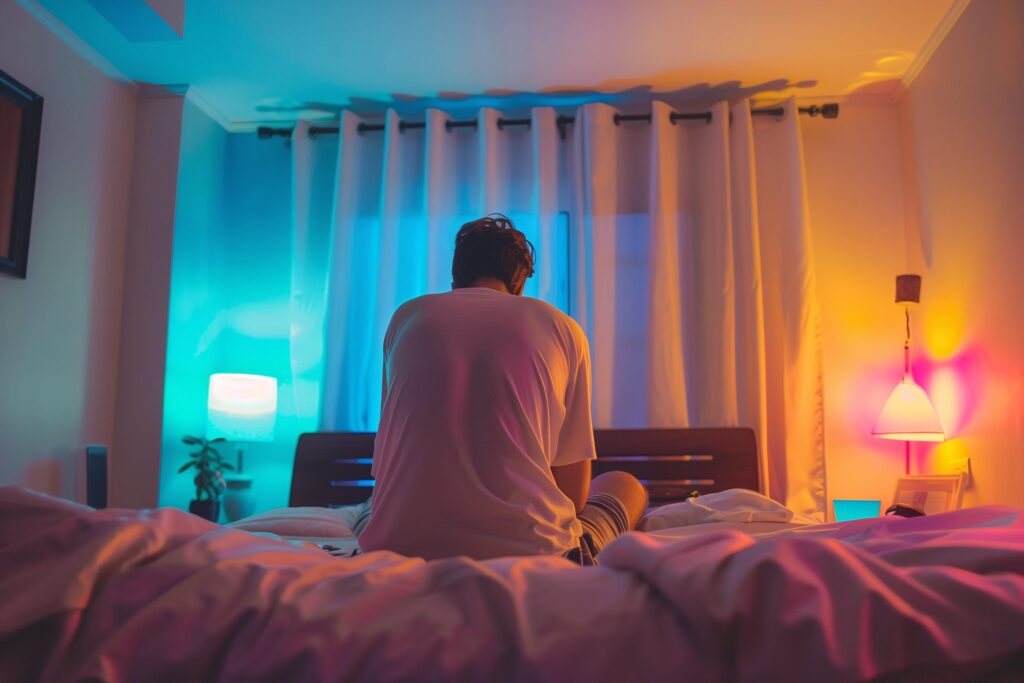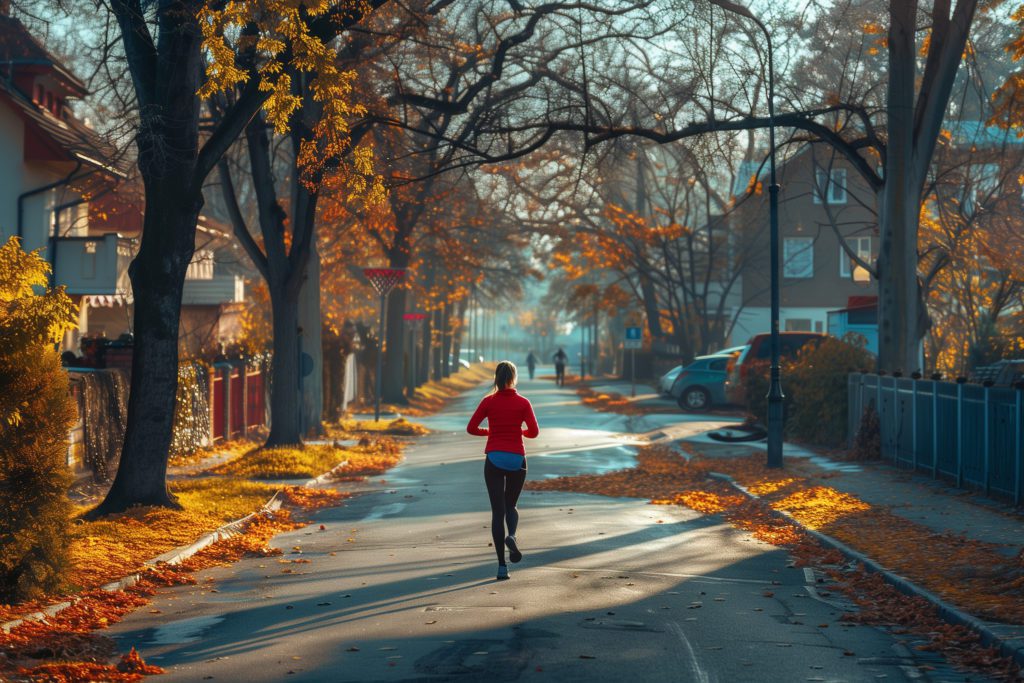
Cardio Workouts for Sleep: How Aerobic Exercise Can Help You Sleep Better
Cardio or aerobic exercise can help you sleep better, reduce stress, and improve your overall health. A single workout may make a difference in your sleep.

Does this sound familiar: You try to get eight hours of sleep a night, but you either toss and turn in bed, unable to fall asleep or you wake up in the middle of the night?
Insomnia is fairly common. One in eight Americans are diagnosed with chronic insomnia. Sleep is crucial for everyone. Left unchecked, sleep problems can wreak havoc on your mental and physical health. So, how can you get better sleep? The answer might lie in…exercise. And, not just any form of exercise, but cardio specifically.
Exercise and Sleep
Not only is exercise good for your health overall, but it is also beneficial for your sleep. Exercising regularly can lead to better sleep quality. That’s because, when done consistently, it helps regulate your circadian rhythm or 24-hour sleep/wake cycle.
Exercise also causes you to burn more energy during the day, which can lead you to feel more tired at night. That’s because exercise stimulates the release of adenosine, which is a hormone that makes us feel sleepy. The harder you workout, the more of this hormone is released. This
increases your homeostatic sleep drive, the driving force that helps you fall asleep.
Cardio promotes the release of chemicals (endorphins) in the brain that naturally elevate your mood and reduce pain. Working out can also reduce your stress levels. All of these things can make it easier to fall asleep.
Cardio and Sleep
All forms of exercise can help you sleep better. But, cardio may be especially helpful. A single session of cardio may be enough to positively impact sleep. One study, published in Scientific Reports, found that one 60-minute cardio session improves the quality of slow-wave sleep that evening. Slow-wave sleep helps regulate metabolism and immune function.
Regular cardio is best for sleep though. Research, published in Mayo Clinic Proceedings, found that people who regularly engage in moderate to vigorous-intensity (70 to 85 percent of maximum heart rate) cardio exercise 75 minutes per week were less likely to take prescription sleeping pills.
In another study, conducted by Northwestern University, older adults with insomnia participated in moderate-intensity aerobic exercise four times a week for six weeks. At the end of the study, participants reported getting 75 more minutes of sleep a night compared to those who did not exercise.
Other studies have found that cardio exercise can help improve obstructive sleep apnea (OSA) symptoms. In one study, participants diagnosed with OSA who participated in regular aerobic (cardio) exercise had a significant increase in sleep efficiency and a reduction in daytime sleepiness.
When Is the Best Time To Do Cardio?
Ultimately, the best time to exercise is when you can fit it into your schedule. However, studies have shown that exercising in the morning may have the best impact on your sleep.
You’ll want to avoid vigorous high-intensity cardio exercise close to bedtime (within a couple of hours). Intense exercise increases your heart rate. This disrupts your body's circadian rhythm. It also delays melatonin production. Melatonin is a hormone that plays a key role in regulating sleep. When melatonin production is delayed, this can make it difficult to fall asleep.
Also, this type of exercise can increase your body's temperature, and elevate cortisol levels. Your body’s temperature naturally falls before bed. So, increasing it right before bed is counterintuitive for sleep. Cortisol is known as the stress hormone. When your body releases higher levels of cortisol, it can also make it harder to fall asleep.
So, are all forms of cardio bad right before bed? The answer is no. It’s not inherently wrong to workout before bed. Current research suggests that evening exercise may not hurt sleep quality, as long as it’s not too strenuous, and might even help some people fall asleep faster. But, make sure you stick to a lower-intensity cardio workout like walking or swimming laps.
The bottom line: Fit cardio in whenever you can find the time. But, plan to do high-intensity workouts at least three hours before you go to bed.
The Best Cardio Exercises For Sleep
There is no single best exercise for sleep. It’s important to find what works best for you. Everyone is different when it comes to fitness preferences. But, aim for moderate-intensity cardio exercise, such as:
- A brisk walk
- Running on a treadmill
- Playing tennis or pickleball
- Fast dancing
- A bike ride
- Swimming
- Water aerobics
- Jumping rope
- Spinning
- Rowing
- Jogging
- Hiking
Any kind of exercise that increases your heart rate so that you can still talk while exercising is considered moderate cardio. If you wear a smartwatch with a heart rate sensor, you’ll know you are in this range when your heart rate is 64-76 percent of its maximum.
Tips: Cardio for Sleep
Here’s a thorough list of tips on how to use cardio to get a good night's rest.
- Stay hydrated - Drink plenty of water or electrolytes (sports drinks) before and after your workout. This will replenish your fluids. It will also ensure that you don’t get dehydrated, which can impair your sleep.
- Stretch - Stretch your muscles both before and after your workout. Stretching has been found to reduce leg cramps that can interfere with sleep.
- Get enough sleep - It’s important to get at least seven hours of sleep a night. You won’t feel energized enough to do cardio if you’re not sleeping enough. You can use Pillow to track your sleep and make sure you are staying on target.
- Relax after your workout- Take some time to wind down after exercising. Do some deep breathing exercises, take a warm bath or shower, or listen to your favorite music. This can help you calm down and relax your body.
- Schedule your workouts - Scheduling your workouts is a good way to ensure that you actually stick with working out. Set a time in your calendar to do cardio. Aim for at least 30 minutes a day.
The evidence suggests that doing cardio regularly can help you catch more Zzzs. Including cardio exercise in your daily routine is one of the best ways to improve your sleep.
FAQ
Can cardio exercise help reduce the need for sleep medications?
Yes. Regular cardio helps improve sleep onset, depth, and duration. Over time, consistent exercise can reduce dependence on sleep medications by naturally enhancing melatonin production and lowering anxiety, a common cause of insomnia.
Does cardio help with sleep disorders like insomnia or sleep apnea?
Yes. Cardio improves sleep efficiency and reduces insomnia symptoms by easing anxiety and stress. It may also lessen sleep apnea severity by aiding weight loss and strengthening respiratory health, especially with consistent practice.
Is morning or evening cardio better for sleep?
Morning workouts may improve alertness and help set a consistent sleep-wake cycle. Evening cardio can also promote sleep, as long as it’s done at least 1–2 hours before bed to avoid overstimulation from an elevated heart rate and body temperature.
Can cardio workouts improve deep sleep stages?
Yes. Regular aerobic exercise increases time spent in slow-wave sleep, which is the most restorative stage. Deep sleep supports immune function, cell repair, and memory consolidation—all of which benefit from physical activity during the day.
Does the environment where I do cardio affect sleep benefits?
Yes. Outdoor cardio in daylight may enhance circadian rhythm alignment, reduce stress, and promote better mood—all of which contribute to more restful sleep. Nature exposure adds a calming effect beyond what indoor workouts often provide.

Written by
Emily Mendez
Emily Mendez is a former therapist and mental health author. She is one of the leading voices in mental health. Emily's writing has appeared in eCounseling, SonderMind, and more. Emily is frequently interviewed by Healthline, Fatherly, INSIDER, Family Circle, and other national media for her advice and expert opinion on the latest mental health topics.
Download Pillow
Get help
Press & News
Legal
Connect
X (Twitter)
Company
Copyright © Neybox Digital Ltd.



